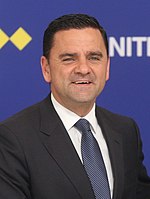
Back Eleccions al Parlament Europeu de 2019 (Portugal) Catalan Europawahl in Portugal 2019 German Elecciones al Parlamento Europeo de 2019 (Portugal) Spanish انتخابات پارلمان اروپا در پرتغال (۲۰۱۹) Persian Portugalin europarlamenttivaalit 2019 Finnish Élections européennes de 2019 au Portugal French Elezioni europee del 2019 in Portogallo Italian Wybory do Parlamentu Europejskiego w Portugalii w 2019 roku Polish Eleições europeias de 2019 (Portugal) Portuguese 2019年歐洲議會選舉 (葡萄牙) Chinese
| |||||||||||||||||||||||||||||||||||||||||||||||||||||||||||||||||||||||||||||||||||||||||||||
All 21 Portuguese seats to the European Parliament | |||||||||||||||||||||||||||||||||||||||||||||||||||||||||||||||||||||||||||||||||||||||||||||
|---|---|---|---|---|---|---|---|---|---|---|---|---|---|---|---|---|---|---|---|---|---|---|---|---|---|---|---|---|---|---|---|---|---|---|---|---|---|---|---|---|---|---|---|---|---|---|---|---|---|---|---|---|---|---|---|---|---|---|---|---|---|---|---|---|---|---|---|---|---|---|---|---|---|---|---|---|---|---|---|---|---|---|---|---|---|---|---|---|---|---|---|---|---|
| Turnout | 30.7% | ||||||||||||||||||||||||||||||||||||||||||||||||||||||||||||||||||||||||||||||||||||||||||||
| |||||||||||||||||||||||||||||||||||||||||||||||||||||||||||||||||||||||||||||||||||||||||||||
 Map of districts and autonomous regions. | |||||||||||||||||||||||||||||||||||||||||||||||||||||||||||||||||||||||||||||||||||||||||||||
An election was held in Portugal on Sunday, 26 May 2019, to elect the Portuguese delegation to the European Parliament from 2019 to 2024. This was the eighth European Parliament election held in Portugal.
The Socialist Party (PS) was the winner of the election, scoring 33.4 percent of the vote. The party increased their share of the votes by 2 percentage points from the 2014 election, and won an additional seat. It was one of the only three times in Portuguese history where the government party won a European election.
The Social Democratic Party (PSD) achieved its worst results ever as a standalone party, with 21.9 percent of the vote, distancing more than eleven points from the winner. The People's Party (CDS), which ran alongside the PSD in the previous election, as part of the Portugal Alliance, also fell below expectations at 6.2 percent of the vote, only being able to elect their top candidate Nuno Melo.
The Democratic Unity Coalition (CDU) scored their worst result as well, narrowly electing two European Parliament members compared with their former three. On the other hand, the Left Bloc (BE) rebounded to previous support levels, more than doubling its vote share to 9.8 percent and electing a new member.
The big surprise of the elections was the result of People-Animals-Nature (PAN). Headed by civil engineer André Silva, PAN won 5.1 percent of the votes and was able to elect its first ever European Parliament member, over-performing the polls.
Turnout, again, fell to the lowest level ever, with only 30.7 percent of voters casting a ballot. Abstention reached an unprecedented level of 99.04 percent for Portuguese citizens living abroad.[1]
Cite error: There are <ref group=lower-alpha> tags or {{efn}} templates on this page, but the references will not show without a {{reflist|group=lower-alpha}} template or {{notelist}} template (see the help page).
- ^ Europeias. Abstenção de 99% entre os emigrantes, Expresso, 28 May 2019. Retrieved 28 May 2019.





